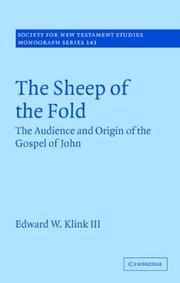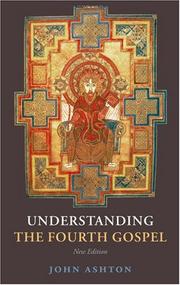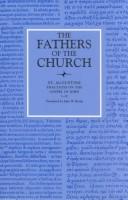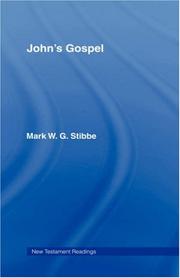| Listing 1 - 10 of 61 | << page >> |
Sort by
|
Book
ISBN: 1282400916 9786612400919 9047440196 9789047440192 9789004173941 9004173943 9781282400917 6612400919 Year: 2009 Publisher: Leiden Boston Brill
Abstract | Keywords | Export | Availability | Bookmark
 Loading...
Loading...Choose an application
- Reference Manager
- EndNote
- RefWorks (Direct export to RefWorks)
Although consistently overlooked or dismissed, John 8.6, 8 in the Pericope Adulterae is the only place in canonical or non-canonical Jesus tradition that portrays Jesus as writing. After establishing that John 8.6, 8 is indeed a claim that Jesus could write, this book offers a new interpretation and transmission history of the Pericope Adulterae . Not only did the pericope’s interpolator place the story in John’s Gospel in order to highlight the claim that Jesus could write, but he did so at John 7.53–8.11 as a result of carefully reading the Johannine narrative. The final chapter of the book proposes a plausible socio-historical context for the insertion of the story.
Formgeschichte --- Literarkritik --- Schreib- und Lesefähigkeit --- Authorship --- Literacy --- Authoring (Authorship) --- Writing (Authorship) --- Literature --- History. --- Religious aspects --- Christianity. --- Jesus Christus --- Jesus und die Ehebrecherin --- Johannesevangelium --- Bible. --- Criticism, interpretation, etc.
Book
ISBN: 9781589839878 9781589839885 1589839889 1589839870 1589839897 9781589839892 Year: 2014 Volume: 1 Publisher: Atlanta
Abstract | Keywords | Export | Availability | Bookmark
 Loading...
Loading...Choose an application
- Reference Manager
- EndNote
- RefWorks (Direct export to RefWorks)
Robert W. Thomson translates this ninth-century commentary defending the miaphysite theological position of the Armenian church against the chalcedonian position of the Greek Byzantine church. Nonnus’s exegesis of the gospel falls in the context of trends in Eastern Christian biblical exposition, primarily the Syrian tradition. Therefore, Thomson emphasizes the parallels in Syriac commentaries on the book of John, noting also earlier Greek writers whose works were influential in Syria. This book is essential reading for anyone interested in the Armenian church and church history.
Bible --- Commentaries --- Early works to 1800 --- Bible. --- Johannesevangelium. --- Jean (Book of the New Testament) --- Johanisi (Book of the New Testament) --- Johannesevangelium --- John (Book of the New Testament) --- Yohan pogŭm --- Yohane den (Book of the New Testament) --- Yūḥannā (Book of the New Testament) --- Ioganaĭ (Book of the New Testament) --- Иоганай (Book of the New Testament)
Book
ISSN: 05121604 ISBN: 9783161507823 3161507827 1299745598 3161527968 Year: 2013 Volume: 307 Publisher: Tübingen : Mohr Siebeck,
Abstract | Keywords | Export | Availability | Bookmark
 Loading...
Loading...Choose an application
- Reference Manager
- EndNote
- RefWorks (Direct export to RefWorks)
Hauptbeschreibung Auf dem Weg zu einer ausführlichen Kommentierung des Johannesevangeliums bietet der Band Vorstudien und Aufsätze aus 15 Jahren zur Auseinandersetzung mit den klassischen Modellen der Johannesauslegung, zur Frage nach dem religionsgeschichtlichen Hintergrund und Kontext des Johannesevangeliums, insbesondere seinem Verhältnis zu den Qumran-Texten und zu den synoptischen Evangelien, zum Profil der Adressatengemeinden und zur Interpretation des Bildes der 'Juden' im Johannesevangelium. Weitere Beiträge behandeln die Brotmetapher in Joh 6 und die Bedeutung und Funktion der dualist
Bible --- Criticism, interpretation, etc --- Theology --- 226.5 --- Evangelie volgens Johannes --- Bible. --- Johannesevangelium --- Johannesbriefe --- Frühchristliche Theologiegeschichte --- Studienliteratur --- Neues Testament --- Religion --- Religion / Biblical Studies --- Religion / Biblical Studies / New Testament --- Bible--New Testament.

ISBN: 9780521875820 052187582X 9780511488023 9780521130448 9780511350108 0511350104 0511349246 9780511349249 1107182271 1281086177 9786611086176 1139132962 0511351003 0511488025 0511348274 0521130441 Year: 2007 Volume: 141 Publisher: Cambridge, UK New York Cambridge University Press
Abstract | Keywords | Export | Availability | Bookmark
 Loading...
Loading...Choose an application
- Reference Manager
- EndNote
- RefWorks (Direct export to RefWorks)
The last generation of gospel scholarship has considered the reconstruction and analysis of the audience behind the gospels as paradigmatic. The key hermeneutical template for reading the gospels has been the quest for the community that each gospel represents. This scholarly consensus regarding the audience of the gospels has been reconsidered. Using as a test case one of the most entrenched gospels, Edward Klink explores the evidence for the audience behind the Gospel of John. This study challenges the prevailing gospel paradigm by examining the community construct and its functional potential in early Christianity, the appropriation of a gospel text and J. L. Martyn's two-level reading of John, and the implied reader located within the narrative. The study concludes by proposing a more appropriate audience model for reading John, as well as some implications for the function of the gospel in early Christianity.
Bible. --- Criticism, interpretation, etc. --- 226.5 --- Evangelie volgens Johannes --- Jean (Book of the New Testament) --- Johanisi (Book of the New Testament) --- Johannesevangelium --- John (Book of the New Testament) --- Yohan pogŭm --- Yohane den (Book of the New Testament) --- Yūḥannā (Book of the New Testament) --- Ioganaĭ (Book of the New Testament) --- Иоганай (Book of the New Testament) --- Arts and Humanities --- Religion
Book
ISBN: 1722501340 172252233X 9781722522339 9781722501341 Year: 2019 Publisher: [Place of publication not identified] : G&D Media,
Abstract | Keywords | Export | Availability | Bookmark
 Loading...
Loading...Choose an application
- Reference Manager
- EndNote
- RefWorks (Direct export to RefWorks)
Bible. --- Jean (Book of the New Testament) --- Johanisi (Book of the New Testament) --- Johannesevangelium --- John (Book of the New Testament) --- Yohan pogŭm --- Yohane den (Book of the New Testament) --- Yūḥannā (Book of the New Testament) --- Ioganaĭ (Book of the New Testament) --- Иоганай (Book of the New Testament)

ISBN: 1282732293 9786612732294 0191538175 1435607244 9780191538179 9780199297610 0199297614 9780199544226 1383044201 9781282732292 6612732296 9781435607248 Year: 2007 Publisher: Oxford Oxford University Press
Abstract | Keywords | Export | Availability | Bookmark
 Loading...
Loading...Choose an application
- Reference Manager
- EndNote
- RefWorks (Direct export to RefWorks)
Arguing that the thought-world of the Gospel is Jewish, not Greek, and that the text is composed over an extended period as the evangelist responded to the changing situation of the community, this book offers a partial answer to a key question: how did Christianity emerge from Judaism?
Bible. --- Jean (Book of the New Testament) --- Johanisi (Book of the New Testament) --- Johannesevangelium --- John (Book of the New Testament) --- Yohan pogŭm --- Yohane den (Book of the New Testament) --- Yūḥannā (Book of the New Testament) --- Criticism, interpretation, etc. --- 226.5 --- Evangelie volgens Johannes --- Ioganaĭ (Book of the New Testament) --- Иоганай (Book of the New Testament) --- Bible NT. Gospels. John
Book
ISBN: 0813211794 9780813211794 Year: 1988 Publisher: Washington, D.C. Catholic University of America Press
Abstract | Keywords | Export | Availability | Bookmark
 Loading...
Loading...Choose an application
- Reference Manager
- EndNote
- RefWorks (Direct export to RefWorks)
Sermons, Latin --- Latin sermons --- Translations into English --- Bible. --- Jean (Book of the New Testament) --- Johanisi (Book of the New Testament) --- Johannesevangelium --- John (Book of the New Testament) --- Yohan pogŭm --- Yohane den (Book of the New Testament) --- Yūḥannā (Book of the New Testament) --- Sermons --- Ioganaĭ (Book of the New Testament) --- Иоганай (Book of the New Testament)

ISBN: 0813211786 9780813211787 9780813210285 0813210283 Year: 1988 Volume: 78 Publisher: Washington, D.C. Catholic University of America Press
Abstract | Keywords | Export | Availability | Bookmark
 Loading...
Loading...Choose an application
- Reference Manager
- EndNote
- RefWorks (Direct export to RefWorks)
Sermons, Latin --- Latin sermons --- Translations into English --- Bible. --- Jean (Book of the New Testament) --- Johanisi (Book of the New Testament) --- Johannesevangelium --- John (Book of the New Testament) --- Yohan pogŭm --- Yohane den (Book of the New Testament) --- Yūḥannā (Book of the New Testament) --- Sermons --- Ioganaĭ (Book of the New Testament) --- Иоганай (Book of the New Testament)
Book
ISBN: 0830879706 9780830879700 9780830844135 0830844139 Year: 2014 Publisher: Downers Grove, IL
Abstract | Keywords | Export | Availability | Bookmark
 Loading...
Loading...Choose an application
- Reference Manager
- EndNote
- RefWorks (Direct export to RefWorks)
Bible. --- Jean (Book of the New Testament) --- Johanisi (Book of the New Testament) --- Johannesevangelium --- John (Book of the New Testament) --- Yohan pogŭm --- Yohane den (Book of the New Testament) --- Yūḥannā (Book of the New Testament) --- Ioganaĭ (Book of the New Testament) --- Иоганай (Book of the New Testament)

ISBN: 1870137248 0203136845 1280326859 9780203136843 9780415095105 0415095107 9780415095112 0415095115 9786610326853 6610326851 0415095107 0415095115 9781280326851 9781870137249 9781134867295 9781134867332 9781134867349 1134867336 Year: 1994 Publisher: London New York Routledge
Abstract | Keywords | Export | Availability | Bookmark
 Loading...
Loading...Choose an application
- Reference Manager
- EndNote
- RefWorks (Direct export to RefWorks)
John's Gospel is an innovative study which shows how the current plurality of literary methodologies can be used effectively to illuminate the text of the fourth gospel. Dr Stibbe, the well-respected author of three previous volumes on St John, uses the methods of structuralism, deconstructionism and narrative criticism in his interpretation. A detailed introduction makes his book accessible to the non-specialist.
The book is an invaluable guide to John's Gospel for all those interested in the Bible as literature. It is important reading for all theologians, students of th
Bible as literature. --- Bible and literature --- Religious literature --- Bible. --- Jean (Book of the New Testament) --- Johanisi (Book of the New Testament) --- Johannesevangelium --- John (Book of the New Testament) --- Yohan pogŭm --- Yohane den (Book of the New Testament) --- Yūḥannā (Book of the New Testament) --- Criticism, interpretation, etc. --- Ioganaĭ (Book of the New Testament) --- Иоганай (Book of the New Testament)
| Listing 1 - 10 of 61 | << page >> |
Sort by
|

 Search
Search Feedback
Feedback About UniCat
About UniCat  Help
Help News
News